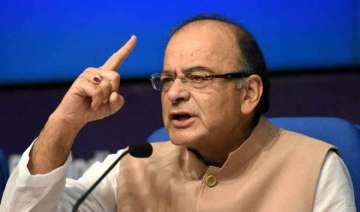GST: April 1 deadline ruled out, Centre now eyes July 1 for rollout
The April 1 deadline for rolling out the Goods and Services Tax was ruled out today as the stalemate over administration of the new tax regime continued, with Finance Minister Arun Jaitley setting up July 1 as the next possible deadline.

The April 1 deadline for rolling out the Goods and Services Tax was ruled out today as the stalemate over administration of the new tax regime continued, with Finance Minister Arun Jaitley setting up July 1 as the next possible deadline.
“There was a broad view that July 1 appears to be a more realistic date to roll-out GST,” Jaitley, who heads the all-powerful GST Council as Union Finance Minister, said, after the 9th meeting of the council.
On the issue of distribution of powers between the Centre and states to administer the goods and services tax with some states adamant on their demand to control tax payers with up to Rs 1.5 crore turnover, Jaitley said a formula has been arrived at.
“All assesses with GST turnover of Rs 1.5 crore or less, 90 per cent of them will be assessed by states and 10 per cent by administrative machinery of Centre,” Jaitley said.
“GST turnover of above Rs 1.5 crore will be assessed in the ratio of 50:50 by States and Centre,” he added.
All states except the West Bengal consented to the proposal. At the meeting today, West Bengal Finance Minister Amit Mitra disagreed to limited division of assessment for turnover below Rs 1.5 cr, Jaitley said.
Earlier, Kerala Finance Minister T M Thomas Isaac told reporters that there was "no agreement” and the discussions were still going on.
He, however, said there were agreements on some other issues, including an "agreement that integrated GST (law) will be mutually empowerment model". Also, "territorial waters, taxation powers will be delegated to the states", he said.
The Council had seen a deadlock for the fifth meeting in a row, with states seeking sole powers to control assessees with an annual turnover of up to Rs 1.5 crore.
The Centre, however, was not in favour of a horizontal split as it feels states do not have the expertise to administer levies like service tax.
Jaitley is also not in favour of dual agencies auditing and scrutinising each taxpayer as he reckons multiple authorities could end up acting at cross-purposes.
"Some people want vertical divisions (of tax payers), others want horizontal division with vertical division of large traders. Some compromise will be worked out," Thomas added.
"Below Rs 1.5 crore could be under the administrative control of states. The Centre would have certain limited amount of audit functions that could be one possible compromise. Discussions are going on."
Addressing the media after the meeting, Jaitley said, “Power to levy and collect IGST tax is with the Centre but by special provision in law, states will be cross empowered in same manner as ratio mentioned.”
The Council, in its previous meeting, had agreed on most of the clauses of the draft IGST law, which along with central GST (CGST) and state GST (SGST) have to be passed by Parliament and state legislatures, respectively, before the new indirect tax regime can be rolled out.
IGST deals in levy on inter-state supply (including stock transfers) of goods or services.
GST will subsume a host of indirect taxes levied by the Centre and states, including excise duty, VAT, service tax, entry, luxury and entertainment levies.
Parliament passed the landmark constitutional amendment in August last year and more than half of state legislatures ratified it by mid-September.
According to Jaitley, GST needs to be rolled out latest by September 16, 2017.
Under the Constitutional Amendment passed by Parliament for GST implementation, some of the existing levies will expire after September 16.
GST is expected to transform India into a single market, boost revenues through better compliance and simpler procedure.